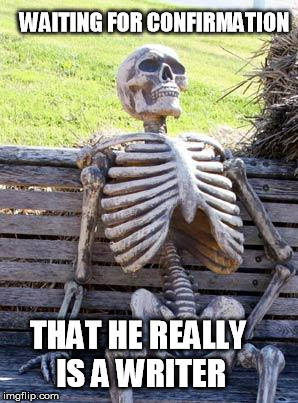Don’t Let Impostor Syndrome Ruin Your Writing — Guest: Kassandra Lamb

I’ve written before about impostor syndrome and how so many of us struggle with the fear of being a fraud. In that post, I shared several insights from Dr. Valerie Young’s presentation at the Romance Writers of America National Conference last year that I found helpful, such as:
- Think about how we define competence, as that definition plays into when we think we’ll be “good enough.”
- Be aware of whether we internalize or externalize our struggles, as internalizing can make us ashamed.
- Figure out what coping mechanisms we use to protect us from shame, as each approach has a price.
- Finally, what steps can we take to change our self-sabotaging thoughts?
Dr. Young pointed out that writers are especially susceptible to impostor syndrome due to the subjective nature of our work. But if we dig deeper into how it affects us as writers, we might recognize—and be able to prevent—some of the ways impostor syndrome holds us back.
To help us do that digging, long-time guest poster Kassandra Lamb is with us today to fill in for me during NaNoWriMo. Kassandra is a writer and a retired psychotherapist, so she’s doubly qualified to give us the insights we need to beat back the self-sabotaging thoughts and behaviors that can hurt our writing.
Please welcome Kassandra Lamb! *smile*
*****
Why Writers Feel Like Impostors Sometimes (and What to Do About It)
by Kassandra Lamb
“Impostor Syndrome”—it’s the bane of a writer’s existence. Am I really a writer? Am I really any good at this writing thing?
Even after we’ve produced several books and they’re selling, we may still encounter those moments of fear—Am I a fraud? Have I just fooled everyone?
Why Is Writing So Prone to Impostor Syndrome?
- “Good” is subjective. No matter how great our talent, some people will love our work, and some will hate it. (Just look at the bad reviews on many of the classics.)
- We are too close to our work to judge it accurately.
- We feel things more intensely than others might. That’s what fuels our creativity, and also our self-doubt.
- Our stories, poems, etc. are our children. Criticism of them is a knife in the heart.
- Any insecurities we have about our worth as a person will feed into insecurities about our work. Criticism will seem harsher than it was intended to be; praise will be seen as people just being kind.
What to Do About It: First, Are You a Writer?
If you write, you are a writer! Claim that title. You have a right to it.
Whether or not you are a good writer is something else. Being good at something almost always involves three things:
- natural talent,
- training, and
- practice.
Talent is the subjective, innate component. (I’ll come back to that.) But the training and the practice you can make happen:
- Take craft classes.
- Find a good critique group, editor, beta readers, etc. who can help you hone your skills.
- And then write. A lot.

How Do You Know If You’ve Got the Talent?
Do we have writing talent? Watch out for impostor-syndrome fears. Click To TweetWhen you are first starting out, have lots of people read your writing and give you feedback.
Then pay close attention to that feedback. This does not mean that you believe all the feedback you get, but pay close attention to it:
Who Is Giving the Feedback?
- Do they have their own agenda (such as making themselves seem important)?
- Or are they sincerely trying to help?
Do They Know What They’re Talking About?
- Do they normally read your genre?
- Are they writers themselves or editors? (They don’t have to be, and just because they are doesn’t mean everything they say is correct.)
I intentionally have at least one beta reader who is not primarily a mystery reader (currently my daughter-in-law, romance writer G.G. Andrew). This gives me a different perspective that I’ve often found quite valuable. But I filter her feedback differently.
For example, she may want more details about the characters’ feelings during a tense scene, but I have to ask myself if that will slow down the pace too much for mystery readers.
Pay Attention to the Tone of the Feedback
- Is it friendly and supportive?
- Or snide and snarky? (Snarky readers/critquers never see my unpublished words ever again!)
What Is the Feedback?
- Ask your early readers, editors, etc. what they like about the story as well as what doesn’t work for them.
- Parse that positive feedback for sincerity.
What Are the Nuances of the Feedback?
You understand the nuances of words. You’re a writer! So look at those nuances.
- Did they “like” the story or did they “love” it?
- Do they claim to have enjoyed it, or enjoyed it “very much?”
If their praise seems a bit tepid, then they may just be trying to be nice.
But if they “loved” it or “really, really” enjoyed it, maybe “very much,” then they really, really did like your words and yes, you have talent!
And here’s my favorite tell…
Do They Seem Surprised that They Liked Your Story?
One of the people who read my first book is an avid mystery reader, a colleague of my husband’s whom I don’t know all that well. She offered to beta read and my husband took her a copy of the manuscript.
I saw her at an office party about two weeks later. “I really loved those characters,” she gushed, a surprised note in her voice. “Are you going to write more stories about them?”
Lots of my friends and family members had praised my writing, but that was the moment when I knew I really had talent, when a virtual stranger sounded surprised that my story was so good and she wanted more of my words!
4 Tips to Prevent Impostor Syndrome from Affecting Us or Our Writing
Tip #1: Only Implement Feedback that Is Truly Right for Your Story
Avoid Impostor Syndrome: Don't make story changes unless they feel right. Click To TweetOne of the things that can trigger “imposter syndrome” is being too quick to change your story based on others’ advice. After several rounds of well-meaning feedback and changes, the story may no longer feel like your own. And you no longer feel like a writer.
Don’t make a change unless that change feels right for you as the story’s creator. It is your story! Keep it that way. Sound feedback will resonate with you, leaving you with a “Yes! This is going to make the story so much better” feeling (fist pumps in the air may or may not be involved).
But if the change doesn’t feel right, don’t make it. Or look for another way to satisfy that person’s concerns. They may have identified a real problem, but their solution may not be right for your story.
In my first book, there is an incompetent, obnoxious cop. Lots of people told me he was too stereotyped, too “all bad” (even though he is patterned after a couple of bad cops I’ve known in real life). I incorporated several people’s suggestions to try to make him more balanced and realistic. The end result was that he no longer felt “real” to me. And reviewers still occasionally complain that he is a stereotype.
If I’d known then what I know now, I would have ditched all those suggestions and totally rewritten his character from scratch.
But my motto is that all feedback is useful, even if I reject it. At the very least it has made me revisit my words, and if I decide that those are exactly the words I truly want to use, then the feedback has done its job.
Tip #2: Thicken Your Skin!
Reading is subjective. A reader's dislike of our story doesn't make us a fraud. Click To TweetEasier said than done for us creatives, since we are sensitive souls by nature.
But there are some things that can help with this. One is to make the words, “No story is every reader’s cup of tea” your new mantra.
You are going to get some one and two-star reviews. I have plenty of them. But I have far, far more four and five-star reviews. That’s what counts! I know my stories are good; they just aren’t for everyone.
Tip #3: Realize “This Is Crap” Is Part of the Process
I have thirteen novels and six novellas under my belt, and I still have those moments when I feel like my WIP should be burned.
Fear your story is crap? That's just a normal part of the process. Click To TweetWith the first draft I just finished (thank the good Lord, it is done), I spent three weeks procrastinating and at best producing 1,500 words A WEEK!
Why? Because I’d concluded that what I had already written was shallow and obvious and…
Only when I decided on a different approach to the second half of the story was I able to get the words flowing again. Even then, I had to keep telling myself, “Just keep writing; you can fix the first half later.”
What kept me going was that I’ve been in that “this is crap” place before. I know it is temporary. I know that if I keep plugging away, eventually the answer to why the story isn’t working will come to me. And I will clean up the “crap” when I rewrite.
Tip #4: Let the Good Stuff in to Bolster Your Self-Esteem!
It’s way too easy to dismiss or quickly forget the good feedback and focus on the negative instead. Let the good stuff in. Take it to heart when readers enthusiastically praise your stories.
Don't dismiss kudos and positive stuff. Let it improve your self-esteem. Click To TweetTreasure those pearls. Hold them close.
And if, despite the sincere positive feedback, the four and five-star reviews, etc., you still feel like a fraud, then maybe you need to work on your self-esteem in general. This is a topic I have talked about before on my blog. It isn’t all that easy to change our self-esteem filters, but it can be done.
I am living proof of that. My self-esteem was in the toilet in my younger years. But now…
I am a writer. Hear me roar!
*****
 Kassandra Lamb is a retired psychotherapist turned mystery writer who now spends most of her time in an alternate universe with her characters. The portal to that universe (i.e., her computer) is located in northern Florida where her husband and dog catch occasional glimpses of her.
Kassandra Lamb is a retired psychotherapist turned mystery writer who now spends most of her time in an alternate universe with her characters. The portal to that universe (i.e., her computer) is located in northern Florida where her husband and dog catch occasional glimpses of her.
She’s the author of the Kate Huntington mysteries, the Kate on Vacation novellas, and the Marcia Banks and Buddy cozy mysteries. She has also written a short guidebook for new authors, Someday Is Here! A Beginner’s Guide to Writing and Publishing Your First Book.
Connect with her at her website, on Facebook, or visit her blog.
*****
 Someday Is Here! A Beginner’s Guide to Writing and Publishing Your First Book
Someday Is Here! A Beginner’s Guide to Writing and Publishing Your First Book
This easy-to-read, how-to guide is full of both practical advice and
emotional support. Psychotherapist turned successful mystery writer, Kassandra Lamb takes novice writers by the hand and walks with them on their journey, pointing out pitfalls along the way, some of which she discovered through stumbled-head-first-into-them experience.
A must-read for new authors who aren’t sure what they’re getting themselves into.
Amazon | Apple | Barnes & Noble | Kobo
*****
Thank you, Kass! Love your advice here, especially your attitude toward feedback that doesn’t work for us or our story.
Like Kassandra, I believe that all feedback is valuable, even if we reject it. As she said, maybe we learn that person’s feedback isn’t helpful to us (such as too snarky or negative). Maybe it helps us recognize that our story is evoking just the reaction we want (even if this reader doesn’t like it). Or maybe it points out a real problem that we can fix another way.
No matter what, we don’t want to let that rejected feedback trigger an attack of impostor syndrome. “Talent” is subjective, and just because our story doesn’t work for one person doesn’t mean it won’t work for others.
Sometimes, we need to write our story, express those emotions, explore that character. So we don’t want to let “feeling like a fraud” restrain us from writing what feels true and right to us. Our truths have value. *smile*
Do you ever feel like a fraud or suffer from impostor syndrome? Has that feeling gotten in the way of your writing or editing? Does it make you doubt yourself and your ability to tell the story? Will this advice help? Do you have any questions for Kassandra?
Pin It
[…] Why Writers Feel Like Impostors Sometimes (and What to Do About It) […]
Thanks so much for having me today, Jami! It’s always such a pleasure to work with you. 🙂
And thank you once again for sharing your awesomeness with us, Kass! 😀
Great post, Kass. We all need these reassurances from time to time!
Thanks, Vinnie!
Interestingly, I don’t suffer from imposter syndrome for writing… In fact, writing is one of the few areas in my life where I don’t have confidence issues! I am MUCH more insecure about my skills as a counselor… (I’m doing my masters in counseling and psychotherapy, and am just doing my practicum; so I’m still relatively inexperienced.)
So when a friend says my paper was very easy to read and understand, I take that to heart and tell my parents and close friends about that great feedback. When someone thinks my sci fi ideas were quite original, I’m happy that they think so. Or if a friend thinks I’m good at humor and comedy-writing, I take their praise seriously too, lol.
At the same time, writing is subjective. Just because these readers liked my work, doesn’t mean everyone will.
I realized sometime ago that I am not that sensitive to criticism, though I used to be when I was younger. For example, a friend says my character should be older because he isn’t acting his age. My response: Well, I don’t agree, but that is an understandable reaction from a reader. Or a friend says my dialogue was too long. I think: Yeah, I agree with her. I’ll think of a way to solve the problem..
Age and experience definitely help overcome our insecurities, Sierhan. I’m glad you feel secure about your writing. You’ll get there with counseling too. There are some similarities in that counseling is a rather vague and to some extent subjective phenomenon. Sure you’re applying skills and techniques you’ve learned but a lot of it is about the connection with the client which is hard to quantify. And again it’s the feedback that builds that confidence, when clients think you’re great and you see them getting better! 🙂
Aw, thanks, Kassandra! ^^ Yeah, I will need a great deal of experience to feel more secure in my counselling skills! But I am still a trainee, so I should be more patient, I guess.
Ha! I’m the wrong one to talk to about patience; it’s never been one of my virtues. But yes, try to give yourself time to develop your skills and your confidence. 🙂
[…] Don’t Let Impostor Syndrome Ruin Your Writing by Kassandra Lamb via Jami Gold […]
[…] Kassandra Lamb cautioned Don’t Let Impostor Syndrome Ruin Your Writing […]
[…] know Imposter’s Syndrome was a thing, but I was certainly in the throes of it. (An excellent guest post by Kassandra Lamb on Jami Gold’s blog can help you self-diagnose. *smile*) I finally attended the Chicago Writing Workshop. Several […]